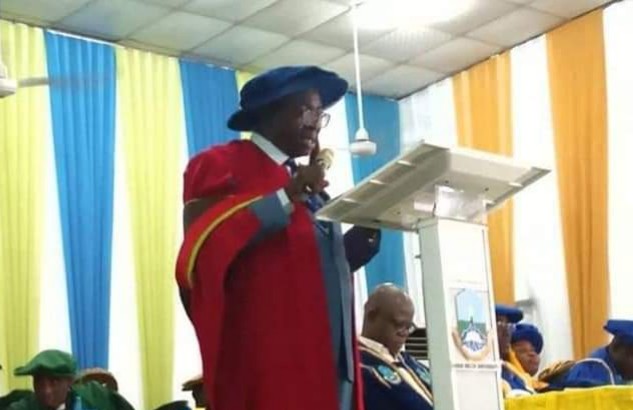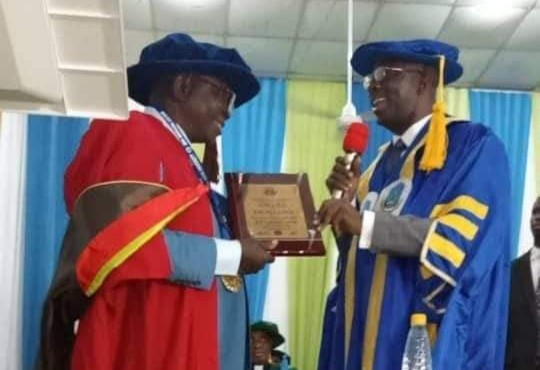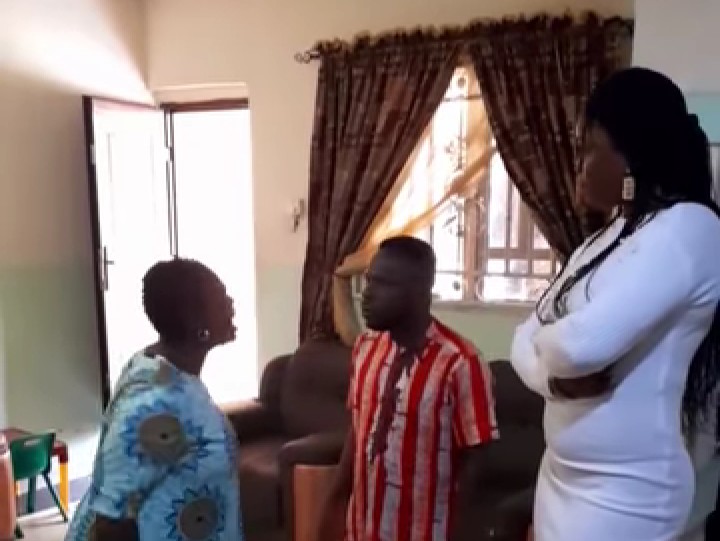
Reinventing Theatre For Society’s Good: Professor Agoro’s Ultimate Theory and Alternative Practice to The Rescue
It’s 38th Inaugural Lecture of the Niger Delta University, NDU, Etete Enideneze x-rays Professor Agoro’s lecture on Reinventing Theatre for society’s good.
The Ivory Tower is the fountain of knowledge, thus the task of university dons is to develop or redevelop knowledge for the advancement of mankind and society.
And it is importantly so, for Nigeria which is emmeshed in lack of effective leadership, social vices, criminality, disunity, insecurity and economic downturn.
One ritual at which, the academia recieve and unveil newly generated theories or ideas and solutions to problems of a country willing to adopt, is inaugural lecture.
The event is about the most prestigious in the career of a Professor who is invited to present a lecture on his or her major research fit(s), embodying all that has been done by him or her in a specialized area.
The university also takes pride in rolling out its erudite scholars to take turns in addressing the community.
So, it was the turn of Professor Saviour Anari Agoro, pioneer lecturer, and pioneer Head of Departments of Theatre Arts and English and Literary Studies, simultaneously, in the Niger Delta University, NDU, Bayelsa State.
His outing was the 38th Inaugural Lecture of the relatively young NDU. It took place June 23, 2021 at the University’s Auditorium.
Prof. Agoro’s topic, which centred on “The Practice of Alternative Theatre in Nigeria”, is important, considering the challenges facing Theatre Arts and the need to reinvent the conventional theatre and Theatre Arts, especially, through new media technologies.
A professor of Dramatic Literature and Theatre Arts, Agoro, took a critical swipe at trends in the discipline, and proposed what he developed over the years and calls, the Ultimate Theory of Theatre.
Agoro has espoused Alternative Theatre and advocated its adoption as a means to meet audiences’ and society’s needs, beyond entertainment purposes, which he criticised, often debases culture and moral values.
By tradition, an inaugural professorial lecture is to be taken hook line and sinker, as the Vice Chancellor, Prof. Samuel Edoumiekumo told the audience. Yet, one will do a bit of journalistic featurizing and analytical reporting, though within the academic context of the lecture and current developments in media and communication.
Indeed, Agoro’s lecture is timely in view of the initially-threatened, but now-expanding theatre Arts, which physical stages for performance were going extinct due initially to cenima, later terrestrial television, satallite and digital broadcasting; new media technologies, General System Mobile phones and social media platforms.
Really, the frontiers of Theatre Arts has expanded. It has moved farther from its traditional stage performance and film-based presentation of plays in cinema halls. Currently, more of the legacy media of radio, television and new multimedia technologies, have helped to step up drama presentations and movies.
The new technologies, have provided access, cheaper production, faster and wider disemination of contents to larger audiences or where need be, to target recipients of entertainment messages, with better quality.
The initial threat to conventional Theatre Arts is like the case of Mass Communication discipline and its sub-professions, especially, Journalism and advertising, let alone Public Relations which rather quickly took advantage of the ICTs trends.
And the threats, still appears to be so, but both Theatre Arts and Mass Communication are undergoing multidisciplinary transformations and taken on aspects of other disciplines within the humanities, social sciences and Computer Science.

In what appears to be identity and boundary conflicts, Theatre Arts, English Language, English Literature, Linguistics and Mass Communication are all broadening their curriculum and practice domains to, aspects of Media Arts, Communication Studies, Media stutdies, Public Relations and Advertising, Journalism, Cultural Studies, Film Studies, Multimedia, Development Communication’ Behaviour and Social Change Communication and so on.
Additional names are being added to the identity of the departments in order to sustain relevance. The trend also seems to be a way of marketing the different, but related programmes to candidates. It is also to tailor the programmes to the employment needs of graduates and employers.
Yet, to know which is which programme is begining to constiitute a problem, especially to those who wish to take any of them at the undergraduate level, and somehow, at postgraduate level. To know who is who in academic and professional practice specialisation is equally a problem, even though the media industry is a vast one that needs various professionals.
Aside these issues, analysed by me, Prof. Agoro is evidently on track in his permutations.
For instance, as he underscored in his inaugural lecture, entertainment has not only become big business, but it is also the driver of tourism and economies in many societies.
And this trend is giving more hope to theatre and dramatic arts which comes in handy in the aspects of film, video, stand-up comedy; carnivals; popular culture, stardom, celebritiship and fandom, etcetera, that are now easily produced, disseminated and propagated to both global and small audiences.
These trends have enhanced commercialization of entertainment, to audiences through various channels and different patterns of charges and means of payments. Added to this is the issue of monopoly of the dramatic entertainment industry by guilds upon guilds in their different areas of control, as rightly pointed out by Prof. Agoro.
His emphasis on commercialisation and union-based monopoly have indeed become serious issues of concern in dramatic and theatrical performances, same as in mass communication in which even news coverage is paid for by sources, against theory and ethics.
Therefore, Prof. Agoro’s theories and advocies are important, for Theatre Arts to take advantage of trends, to further reposition its discipline and practice for societal benefit, and above all to the glory of God, as posited by him.
Prof. Agoro who has traversed the territory of Dramatic Literature and Theatre Arts, a journey he began from the early 1980s to now that he is at the apogee of specialized knowledge, spoke with his usual calmnes, yet in a firebrand way, at the NDU’s Auditorium, to the applause of the audience.
He authoritatively submitted that, dramatic and theatrical performances must glorify God, a perspective, he summed up as the Ultimate Theory of Theatre, propounded by him, from a pool of academic studies and professional practices, over the years.
“As I was introduced, I am also a Man of God. I am an ordained pastor in Greater Evangelism World Crusade. God has been helping me. So, I have to help in promoting God, through my academic and professional callings”.
From his hand bag of artistic humour, he cited an instance of how God protected him. He narrated that, he would have been killed in the farm, when as a baby, he crawled away from his mat and was mistaken by other farmers for a punkupine to be matcheted, but for the quick intervention of his mother. It was during the Nigerian-Biafran War, when they had taken refuge in the bush.
For him, the fact that, he, as that lad grew up to become a professor, according to him, was a good reason to glorify God with his knowledge.
“I cannot promote devil. What has devil given to me, that I will promote him”, Professor Agoro, he humorously and rhetorically asked.
He harped the need for theatre and dramatic writers and practitioners to use their works and skills to give contents beyond entertainment, so as to promote God, as well as offer lessons which will make human beings and society better.
Prof. Agoro postulates that, a potent way out of the economic and profit-motive factor; debacle of monopoly by guilds and culturally and morally debasing contents, is alternative theatre.
Alternative theatre, according to him are dramas produced without real or no commercial interest at all, and are indepently produced cheaply, then presented to audiences, free of charge. They serve entertainment purpose, but go beyond that, to criticize and correct socio-political ills; promote morality and the common good of society, the lecturer further explained.
He contrasted alternative Theatre with commercial or mainstream theatre, mainly, that the latter are large organisations set up by businessmen to make profit, hence entertainment goal goes with commercial intent which could bring about contents not really meant for the good of society. Commercial theatre falls into same category of mainstream or established theatre, that are owned by government.
He contended that these mainstream theatre organisations, pander to the interests of their owners, thus are less critical of the ills of those funding their productions.
Agoro’s perspectives are useful, thus, his call for Inclusion of the Ultimate Theory of Theatre and Alternative theatre as a course and an area of specialization in the curriculum of the discipline is appropriate. This is more so for the NDU’s Theatre Arts Department.
After all, as he put, ordinarily, a Theatre Arts graduate is trained to create enteraining performances, and be able to work independently, even though, he or she could get employed in theatre companies, cultural centres and elsewhere.
But that, the scenario of monopoly by guilds, as in the Nollywood and exploitation of young talents by the financiers of films and inadequate theatre and performing companies, make it difficult for graduates to get engaged in the trade to utilize their potential.
Today’s theatre department, that of NDU, in particular, as recommended by Prof . Agoro, thus, need to adequately teach, learn and practice alternative ways to writing, producing and dissemminating drama-messages to audiences. To this I would like to add, that Agoro’s submissions are workable, with the use of new media technologies.
To produce competent Theatre Arts graduates who could practice to earn a living, Agoro called for discipline on the part of lecturers and students, to avoid use of sexual and other forms of gratifications to give or get marks for assessments.
He identified feasible aspects for alternative practice as community theatre; educational, children, developmental, religious or christian and political, ethnic and feminist theatre, besides performing art, as niche areas.
These areas, he noted, would impact possitvely on society, and glorify God, the Ultimate Being, more than the commercial and government-sponsored productions.
To subscribe to Agoro’s views, I reiterate that the new multimedia technologies and convergence, that is, combination of the old models of dramatic theatre with current models/new technologies, will boost alternative theatre practice in Nigeria, and even other African Countries.
Note that the inaugural lecturer, is not dismissing mainstream commercial and Government theatre or profit-based entertainment.
He is rather of the stance that, independent and non-profit modes should be encouraged to exit with the commercial and government-owned models, for the interest of the commoners, good of society and to the glory the Almighty God.
Indeed, his grand theory of Ultimate Theatre, as well as the advocated alternative theatre practices, ought to serve as one potent solution to the plethora of moral, leadership and economic decay in Nigeria, where fear of God has been jettisoned.







